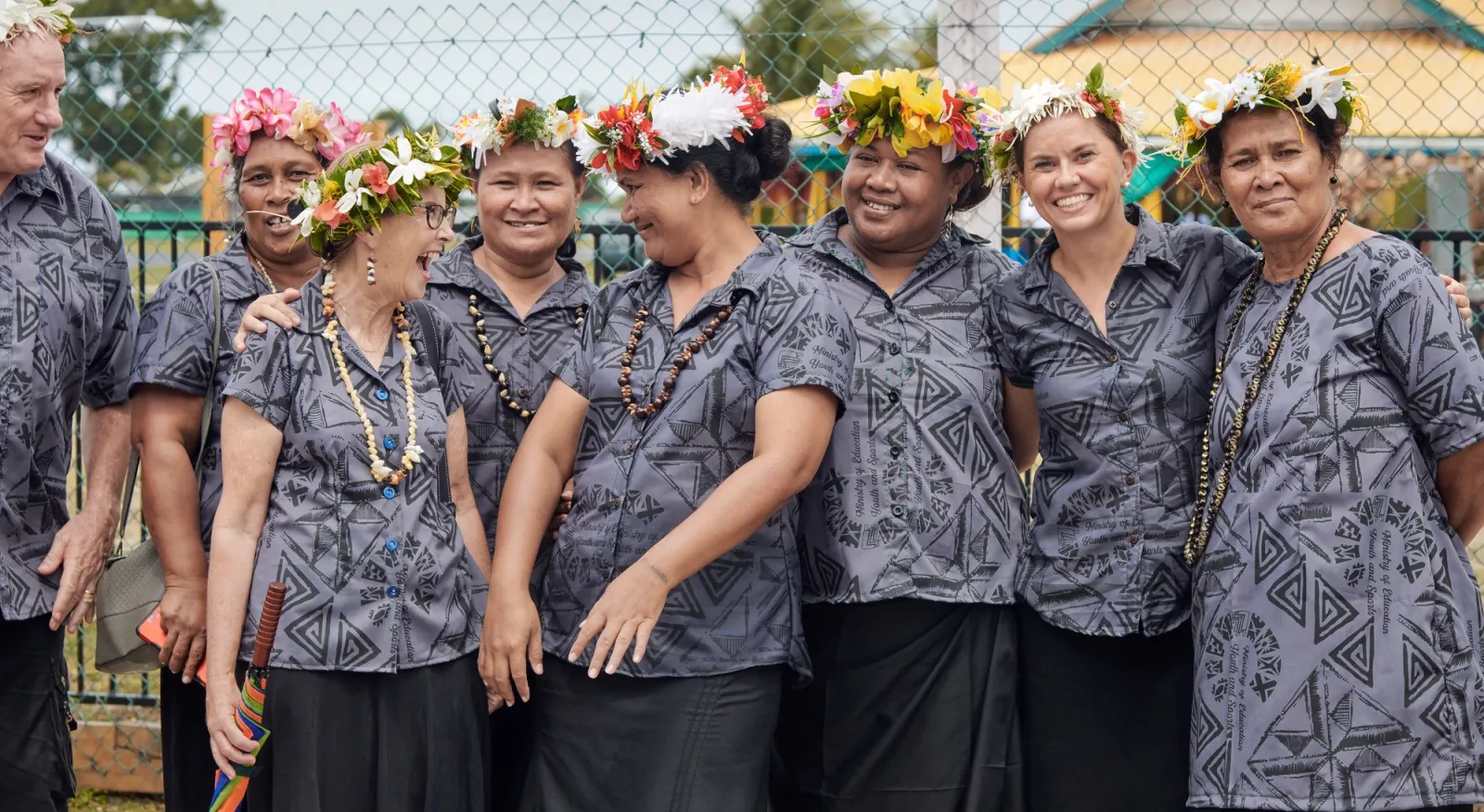Strengthening child protection in Tuvalu
How an Australian volunteer is working with the Tuvaluan Government and UNICEF to protect and advocate for children.

Gabi McMahon is helping develop and strengthen child protection in schools and communities across Tuvalu’s nine islands. Here she tells us about the unique challenges she has faced, and the rewards of living and working on an island nation of 11,000 people.
How would you describe life in Tuvalu?
Tuvalu is not a tourist destination (although in my opinion tourists are missing out!)
Life here is incredibly varied - one afternoon might be spent preparing fou’s (flower garlands) that will be gifted to the construction workers as they complete the new conference centre, another might be spent on an uninhabited atoll drinking fresh coconuts and swimming in clear blue waters, and another organising an import permit so you can bring an esky of fresh fruit and veg back with you on your next flight.
Living in Tuvalu is amazing and unique. The small population size allows you to get to know a lot of the local people and connect in a meaningful way with the people and culture.
What does your role as a child protection technical assistant involve?
We are advocating for, building awareness of and strengthening child protection in an attempt to prevent and respond to violence, exploitation and abuse against children.
My aim is to find a balance between the best parts of the systems we have in Australia and the strengths already present in Tuvaluan schools and communities.
In partnership with UNICEF, I am based within the Tuvalu Ministry of Education, Youth and Sport (MEYS) but work closely with all government ministries.
My role involves supporting the MEYS to develop and implement a child protection policy for all schools across the country. Students (pre-school, primary and secondary) make up 35-40% of the population and represent the next generation who will continue to generate change whilst maintaining tradition and culture.
What are you most proud of achieving on assignment so far?
Working closely with my colleagues and after consulting with stakeholders and the community, we have developed a draft Child Protection in Schools Policy which is reflective of the strengths of the communities and schools in Tuvalu.
The policy spans prevention, intervention and response and outlines key information and responsibilities for teachers, students, school leaders and MEYS staff. We will do further consultation before the policy is launched as we want to ensure it is community owned and modelled to the unique context of Tuvalu.
The focus of the remainder of my assignment will be the implementation of this policy, which will include developing the supporting regulatory framework, teacher and student training, curriculum development and activities in schools.
What have been the most challenging aspects?
Child protection, particularly aspects like the discipline of children, can be a sensitive topic and it is difficult balancing change and tradition. Due to a number of factors these challenges have been more significant than I anticipated.
These attitudes and understandings forced me to slow down and reassess my approach. I’ve learnt that sometimes the best thing you can do is stop and have conversations - with a parent, teacher, pastor - to build a common understanding.
The internet is often down and even when it’s running it can be slow and is expensive. This can be difficult both in having the opportunity to speak to friends and family back home, and in being able to do online research for my work.
It certainly means getting creative and, rather than emailing locally, you often just knock on someone’s door.
How has your assignment met, or been different, to your expectations?
I’ve learnt to expect the unexpected and be grateful for the opportunities that come along. I’ve been lucky to be here this year when the people of Tuvalu have proudly showcased their culture while playing host to the United Nations Secretary General and the 50th Pacific Island Leaders Forum.
The Forum was attended by 18-member countries including Australia. The MEYS held several responsibilities including welcoming world leaders, attending forum meetings, performing traditional island dances (fatele) and acting as liaison for many of the Pacific Island delegates.
Professionally I’ve represented the MEYS in UN Pacific Strategy meetings, and have been involved in a World Bank project and a review of the Tuvalu Education Act.
What's the most important thing you've learnt?
Pacific or ‘Tuvalu time’ is a saying for a reason. While this took a bit of adjustment due to my (previous) obsession with punctuality, I’ve learnt that slowing down is an important skill.
My colleagues have taught me to look at productivity differently, not get frustrated when things don’t go according to your timeline and to value informal conversations as much as finalising a report.
The people of Tuvalu are selfless, patient and warm and I know I’ll continue to learn much more from them over the coming months.
The capital Funafuti is only 11 kilometres long and you can’t run, walk or ride your bike down the street without being greeted with hello’s and ‘talofa’ (Tuvaluan greeting) from women, men and children. While it certainly has its challenges, the lifestyle, the incredible people, the fulfilling work and the stunning scenery make it all worthwhile.